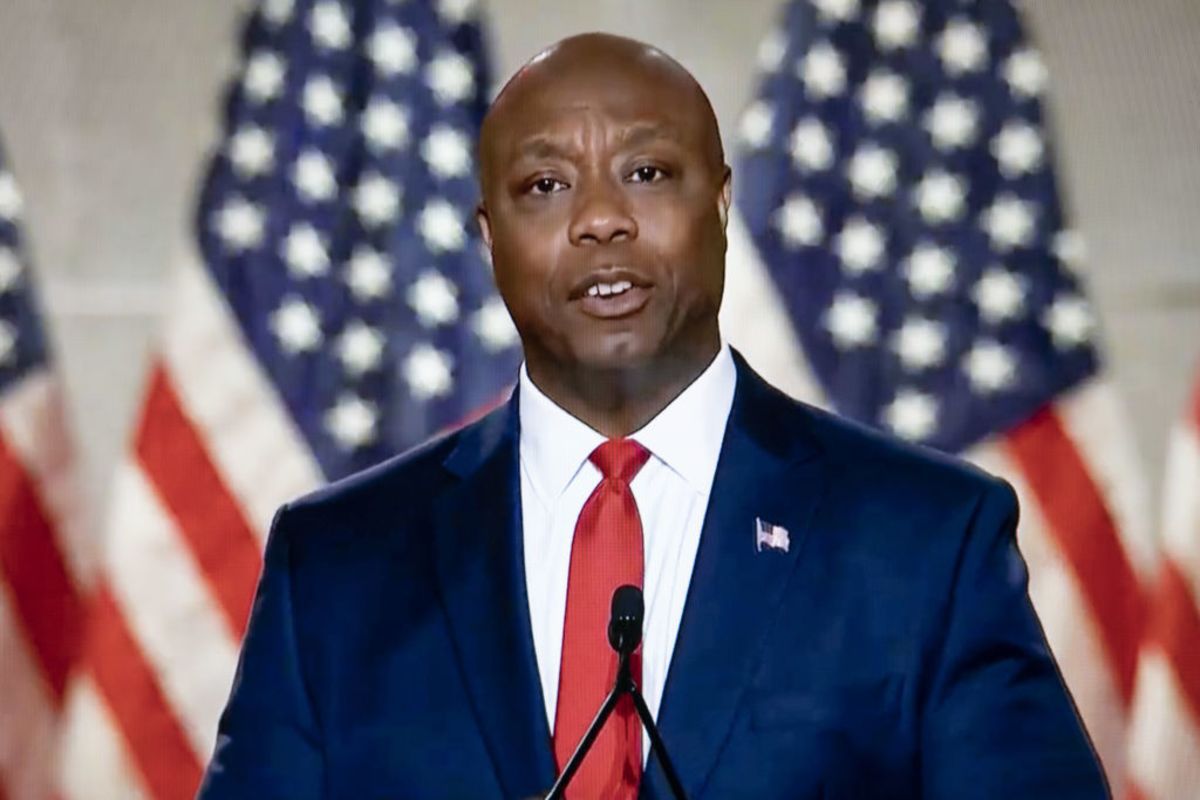On This Page
Tim Scott for senator
Tim grew up in poverty in a single-parent household in North Charleston. His mom worked 16-hour days as a nursing assistant to keep food on the table and a roof over their heads. Tim admits his circumstances left him hopeless, and as a result, he nearly failed out of high school. By the grace of God, Tim met his mentor, a Chick-fil-A operator named John Moniz. Moniz taught Tim Biblical principles and Conservative values. Through the love, prayers, and strength imparted by his mom and Moniz’s idea that you could ‘think your way out of poverty,’ Tim’s life got back on track.
Tim graduated from Charleston Southern University with a political science degree. He went on to build his successful small business from the ground up. Inspired by the lessons from his mentor, Tim set out to positively effect the lives of a billion people. He was first elected to public office in 1995 and served at the local and state level until his election to the U.S. House of Representatives in 2010.
In 2013, Tim joined the U.S. Senate. His signature legislation, Opportunity Zones, has infused $75 billion of private investments into distressed communities across the country in just a few years. As he continues his work to lift Americans out of poverty, Tim also plays a critical role in protecting the unborn, Second Amendment rights, police and criminal justice reform, credit access, education, connectivity, and workforce development.
Tim brings a fresh perspective to Washington, and his remarkable story shows the transformative power of Conservative values. He will keep fighting to ensure folks in South Carolina—and across the country—have the opportunity to succeed.
Opportunity Zones
Opportunity Zones, a bipartisan initiative authored by Senator Tim Scott and enacted through the Tax Cuts and Jobs Act, empowered the governors of each state to designate economically-distressed communities that were ripe for investment and tie them to a brand new federal tax incentive to drive private investment into our nation’s most distressed zip codes.
More than 50 million Americans currently live in economically-distressed communities. Opportunity Zones put the decision-making in the hands of state and local leaders who know their communities best. This incentive aims to lift entire communities out of poverty by attracting private dollars to the corners of our country that have been left behind as the American economy has surged forward.
Quality Education
As the chair of the Senate School Choice Caucus, I am a firm believer that a child’s zip code should not dictate his or her access to quality education nor define the child’s future. This means increasing the availability of and access to whichever educational model a particular family finds best for their situation: public school, private academies, home schooling, charter school, or other cutting-edge models.
At the Higher Education level, this also means that the invaluable work of our nation’s Historically Black Colleges and Universities must be recognized, encouraged, and expanded. HBCUs fill an important role in educating our youth, especially students of color. They also provide unique and valuable research, development and leadership to our society. I will continue to ensure they receive the attention and resources they deserve. Looking across all of our postsecondary institutions, including HBCUs, we also have a responsibility to provide families with the tools and information they need to make informed decisions on which pathways to opportunity are right for them.
Bridging The Wealth Gap
With the right tools and opportunities, Americans can achieve financial security, provide for their families, gain an education, start a business, buy a house, and engage in the modern economy – without unnecessary red tape and regulations. Having a salary is a great thing, but building wealth for your family’s future is an amazing thing, The more we can bridge the wealth gap that has developed in our nation, the more successful we will all be.
The bipartisan Financial Literacy Caucus, which I co-chair, serves as a platform for promoting the practices, skills, and policy levers most likely to produce responsible and robust savings, along with wealth creation. Retirement security has been one of my top priorities, and I successfully led the charge to increase access to retirement plans and enhance savings through the enactment of the SECURE Act.
Through the enactment of my MOBILE Act, individuals in underbanked and underserved communities can easily open bank accounts and quickly connect to banking services. My Credit Score Competition and Credit Access And Inclusion Acts allow individuals to use alternative means of showing “good credit” – including making rent and utility payments. I will continue working to expand, adapt, and educate people about banking, entrepreneurism, finance, and financial literacy to encourage economic uplift.
Empowering the Innovation Economy
Ever-changing technology, trade patterns, and career paths have created new opportunities and flexibilities for workers, entrepreneurs, and innovators of all sizes and from all sectors. Our citizens and our businesses have been adapting, changing and modernizing far faster than the federal government, and I am working to bring flexibility and modernization to Washington, DC, so that government is an asset, not a hindrance.
I’ve been working since I entered the Senate to incentivize high-quality apprenticeship programs, which have proven extremely successful in South Carolina, and my Modern Worker Empowerment Act would facilitate innovative business models by adopting a commonsense worker classification standard across different federal laws. The bipartisan SKILLS RENEWAL Act could be a game-changer for workforce development programs, as it would create a flexible skills training credit to give Americans ownership over their upskilling and reskilling pathways. Through bills like the Helping Gig Economy Workers Act, which I helped to introduce, I have also begun working with my colleagues to increase access to benefits for independent contractors in a market-driven manner. We can build on these proposals to unleash innovation and empower workers across our economy.
Balancing the Scales of Justice
When Walter Scott was murdered by a police officer in my hometown of North Charleston in 2015, I immediately stepped forward to begin offering solutions. I introduced the Walter Scott Notification Act, to require police departments report every time an officer’s weapon was discharged. I also authored the Safer Officers and Safer Citizens Act to ensure widespread use of body cameras by jurisdictions across the country.
Following the murder of George Floyd in May 2020, I led the charge to build a comprehensive package in the United States Senate that focused on police reform, transparency and accountability. The JUSTICE Act would accomplish the following:
Law Enforcement Reform
- The JUSTICE Act strengthens the training methods and tactics throughout law enforcement jurisdictions, especially regarding de-escalation of force and the duty to intervene, providing law enforcement with new funding to do so, and will also end the practice of utilizing chokeholds
- Additionally, the bill will reform hiring practices by providing more resources to ensure the makeup of police departments more closely matches the communities they serve
- The JUSTICE Act also ensures when a candidate is interviewed, the department looking to hire will have access to their prior disciplinary records
- Too often, after a tragic incident, we have learned the offending officer had a disciplinary past in another jurisdiction of which their current employer was unaware
Accountability
- Studies show that when body cameras are properly used, violent encounters decrease significantly
- The JUSTICE Act will put more body cameras on the streets, and ensure that departments are both using the cameras and storing their data properly
- JUSTICE also requires a report establishing best practices for the hiring, firing, suspension, and discipline of law enforcement officers
Transparency
- Currently, only about 40 percent of police officers from jurisdictions nationwide report to the FBI after an incident where an officer has discharged his or her weapon or used force
- The bill will require full reporting in these two areas
- There is also very little data as to when, where and why no knock warrants are used, and the JUSTICE Act will require reporting in this area as well
Additional Steps
- The JUSTICE Act will finally make lynching a federal crime
- It also creates two commissions to study and offer solutions to a broader range of challenges facing black men and boys, and the criminal justice system as a whole
While Senate Democrats have so far blocked any effort to pass reforms in the Senate, I will continue fighting.
PROTECT LIFE
Life has intrinsic value and we are endowed by our creator the inalienable right to life. Tim Scott knows that a society is judged by how it treats its weakest members, that is why it’s time to be a champion for the most defenseless person in the world: the unborn child. Tim believes that life begins at conception and he supports legislation that limits late-term abortions. He also believes that taxpayers should not be required to pay for abortions.
SECOND AMENDMENT
Tim Scott is devoted to defending the right of law-abiding Americans to bear arms to defend themselves, their families, and their property. Tim believes the Second Amendment is fundamental to ensuring freedom and democracy and it should not be infringed upon.
PROTECTING AMERICAN WORKERS
Tim Scott believes in the dignity of all work.
Raising the minimum wage to $15 in the midst of a pandemic would crush small businesses to include restaurants that are already struggling to survive. This out-of-touch mandate could cost as many as 3.7 million hardworking Americans their jobs. Tim co-sponsored an amendment to protect these small businesses during the pandemic, however, the fight is not over. As America emerges from the pandemic, ideas that stifle growth will resurface. Tim Scott believes we should build on proposals that drive innovation, empower workers, and grow our economy.


